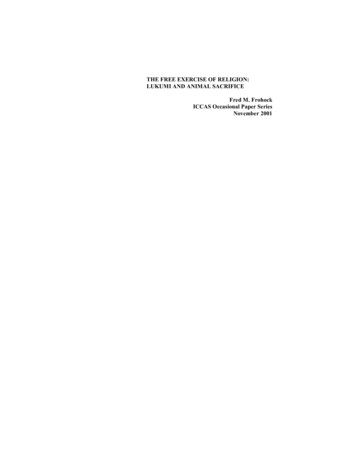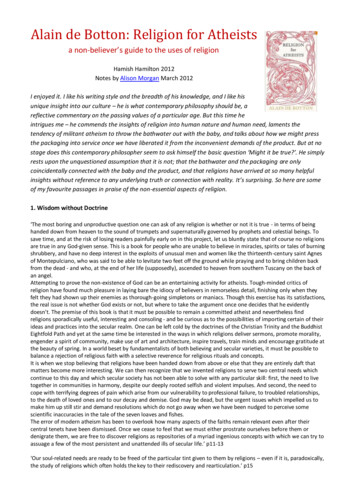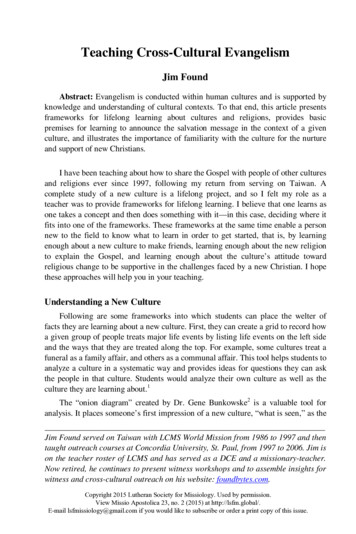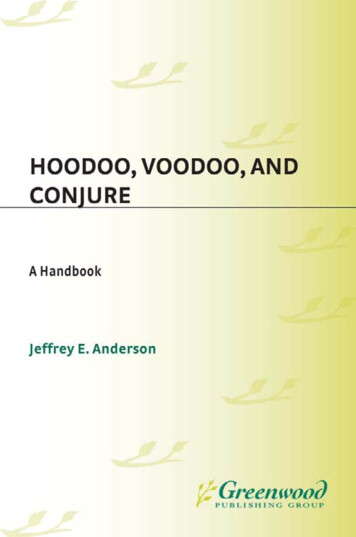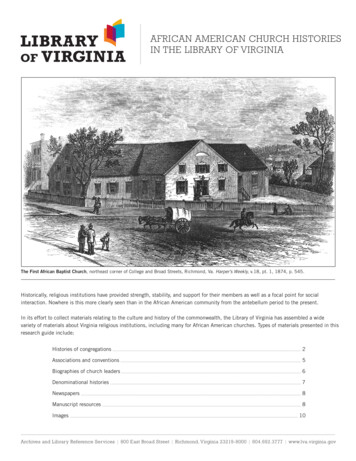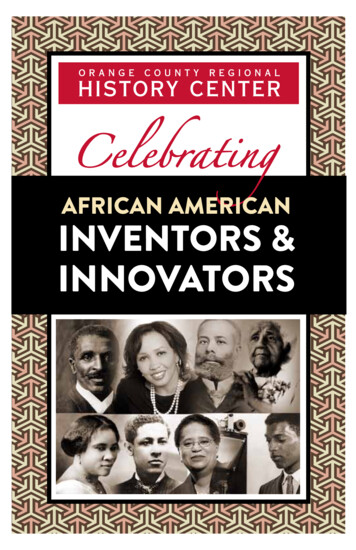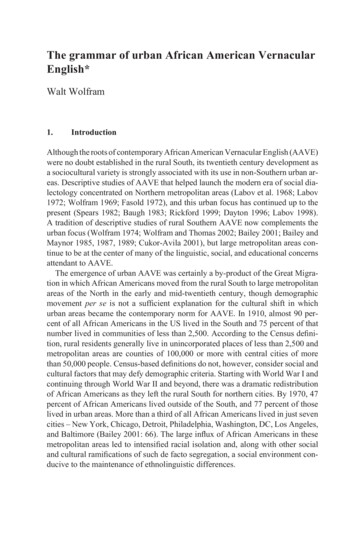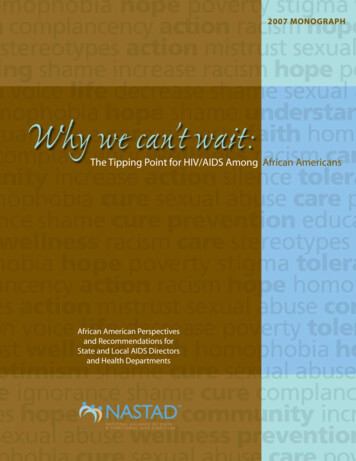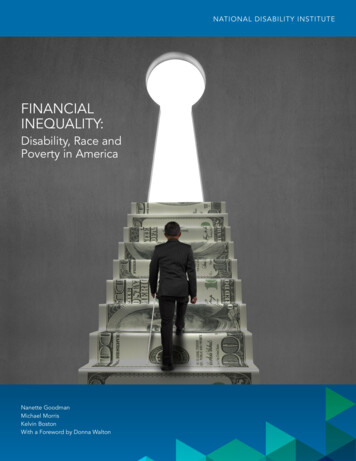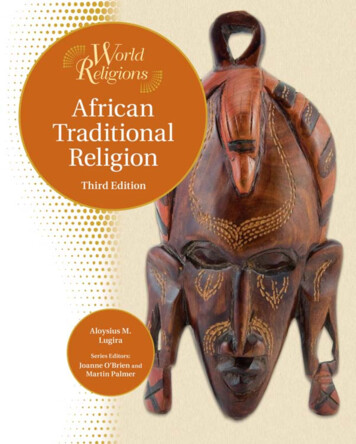
Transcription
WORLD RELIGIONSAFRICAN TRADITIONALRELIGIONTHIRD EDITION
WORLD RELIGIONSAfrican Traditional ReligionBaha’i FaithBuddhismCatholicism & Orthodox Native American ReligionsProtestantismShintoSikhismZoroastrianism
WORLD RELIGIONSAFRICAN TRADITIONALRELIGIONTHIRD EDITIONbyAloysius M. LugiraSeries Editors: Joanne O’Brien and Martin Palmer
African Traditional Religion, Third EditionCopyright 2009, 2004, 1999 by Infobase PublishingAll rights reserved. No part of this book may be reproduced or utilized in any form or by any means, electronicor mechanical, including photocopying, recording, or by any information storage or retrieval systems, withoutpermission in writing from the publisher. For information contact:Chelsea HouseAn imprint of Infobase Publishing132 West 31st StreetNew York NY 10001Library of Congress Cataloging-in-Publication DataLugira, Aloysius Muzzanganda.African traditional religion / by Aloysius M. Lugira. —3rd ed.p. cm. — (World religions)Includes bibliographical references and index.ISBN 978-1-60413-103-11. Africa—Religion. 2. Africa—Religious life and customs. I.Title. II. Series.BL2400.L84 2009299.6—dc222008051188Chelsea House books are available at special discounts when purchased in bulk quantities for businesses,associations, institutions, or sales promotions. Please call our Special Sales Department in New York at(212) 967-8800 or (800) 322-8755.You can find Chelsea House on the World Wide Web at http://www.chelseahouse.comThis book was produced for Chelsea House by Bender Richardson White, Uxbridge, U.K.Project Editor: Lionel BenderText Editor: Ronne RandallDesigner: Ben WhitePicture Researchers: Joanne O’Brien and Kim RichardsonMaps and symbols: Stefan ChablukPrinted in ChinaCP BRW 10 9 8 7 6 5 4 3 2 1This book is printed on acid-free paper.All links and Web addresses were checked and verified to be correct at the time of publication. Because of thedynamic nature of the Web, some addresses and links may have changed since publication and may no longerbe valid.
CHAPTER 1CHAPTER 2CHAPTER 3CHAPTER 4CHAPTER 5CHAPTER 6CHAPTER 7CHAPTER 8CHAPTER 9CONTENTSPrefaceIntroduction: Africa and Its PeopleThe Beginning of Time:The Oral TraditionThe Supreme BeingThe Spirit WorldRites and Ritual in African ReligionSacred Spaces and PlacesMystical ForcesAfrican Religion in Today’s WorldAfrican Religion Past, Present, and FutureFact File and BibliographyFurther ReadingWeb SitesGlossaryIndexAbout the Author and Series EditorsPicture Credits68263646648896104116132134135136140144144
PrefaceAlmost from the start of civilization, morethan 10,000 years ago, religion has shapedhuman history. Today more than half theworld’s population practice a major religion or indigenous spiritual tradition. Inmany 21st-century societies, includingthe United States, religion still shapes people’s lives and plays a key role in politicsand culture. And in societies throughoutthe world increasing ethnic and culturaldiversity has led to a variety of religionsbeing practiced side by side. This makesit vital that we understand as much as wecan about the world’s religions.The World Religions series, of whichthis book is a part, sets out to achieve thisaim. It is written and designed to appealto both students and general readers. Thebooks offer clear, accessible overviews ofthe major religious traditions and institutions of our time. Each volume in theseries describes where a particular religionis practiced, its origins and history, its central beliefs and important rituals, and itscontributions to world civilization. Carefully chosen photographs complementthe text, and sidebars, a map, fact file, glossary, bibliography, and index are includedto help readers gain a more completeunderstanding of the subject at hand.These books will help clarify whatreligion is all about and reveal both thesimilarities and differences in the greatspiritual traditions practiced around theworld today. African Traditional ReligionReligions of AfricaNorthern AfricaWestern AfricaEastern AfricaCentral AfricaSouthern Africa
Infobase PublishingPreface
CHAPTER 1INTRODUCTION:AFRICA ANDITS PEOPLEIwa ni csin“Character is religion.”This proverb of the Yoruba people of Nigeria, West Africa,expresses a fundamental truth about the character of theAfrican people. When they are in need they turn to superhumanpowers for help. They address their prayers to a God, either directly or indirectly, through lesser gods or spiritual go-betweens.When they address their God the elders of the Kikuyu people of Kenya, for example, gather the people of the communitytogether under a sacred tree. A procession arrives. At its head aretwo children. A boy carries a calabash, or gourd, filled with milk;a girl carries a calabash of honey-beer. A lamb follows them, andlast come the elders. When the procession reaches the base of thesacred tree, the leading elder takes the calabashes from the children. Facing Mount Kenya, he raises the calabashes and addressesGod with the following prayer.Acacia trees growing on the savanna of Tanzania.The extensive spirit world of African religion includesspirit guardians that reside in natural landmarkssuch as rivers, mountains, or trees. These places oftenbecome the focus of communal ritual. African Traditional Religion
Introduction: Africa and Its People
“Reverend Elder who lives on Kere-Nyaga (‘Mountain ofBrightness,’ which is the Kikuyu name for Mount Kenya). Youwho make mountains tremble and rivers flood; we offer youthis sacrifice that you may bring us rain. People and children arecrying; sheep, goats, and cattle are crying. Mwene-Nyaga (‘Possessor of Brightness,’ the Kikuyu name for God), we beseech you,with the blood of this lamb, which we are going to sacrifice toyou. Refined honey and milk we have brought for you. We praiseyou in the same way as our forefathers used to praise you underthis very same tree, and you heard them and brought them rain.We beseech you to accept this, our sacrifice, and bring us rain ofprosperity.” The people respond, “Peace, we beseech you, Ngai,peace be with us.”More than 930 million people live on the African continent.Many are at home in the bustling cities of the north—Cairo, Tripoli, Tunis, Algiers—where the religion today is predominantlyIslam. In sub-Saharan Africa, especially in the eastern and western coastal countries and in southern Africa, Christianity is thepredominant religion. However throughout Africa, especially incentral Saharan regions, many people live in communities thatat least to some extent follow traditionalfoLLowERs of AfRiCAn RELigionways of life that stretch back thousandsof years.frican countries where African reliBeginning in prehistoric times the peogion is practiced by more than 33ple of Africa gathered in groups relatedpercent of the populationby family ties and similar needs. Thesecommunities developed their own indiBenin 51.5%Sierra leone 46.4%vidual languages, cultures, practices, andguinea-Bissau 45.4%religions. Although waves of explorationBotswana 38.8%and modernization have had their impactMozambique 35.1%on the traditional African way of life, it isliberia 34.1%estimated that there are more than 6,000ivory coast 33.5%different peoples in Africa today. Many ofBurkina faso 33.5%these people continue to live by the spiri(Source: www.adherents.com)tual influence of their ancestral way of life.Even after they have left their native vil-A10AfricAn TrAdiTionAl religion
AfRiCAn RELigion As mAnifEsTED By AfRiCAn EThniCiTiEsNorthern Africa Obsolete Religions:Berber religioncushite religionegyptian religionEastern Africa Obsolete Religion:Aksumite religionEastern Africa Living Religions:dinka religionnuer religionShilluk religiongalla religionAcholi religionAteso religionBaganda religionBagisu religionBanyankore religionlangi religionBanyoro religionlugbara religionAkamba religionAkikuyu religionMaasai religionBahaya religionBachagga religionBafipa religionBahehe religionBamakonda religionBanyakyusa religionBasukuma religionBanyamwezi religionCentral Africa Living Religions:Babemba religionBacongo religionBaluba religionBandembu religionBanyakyusa religionBaka religionBambuti religionShona religionBanyarwanda religionBarundi religionSouthern Africa Living Religions:!Kung religionKhoi religionlovedu religionSan religionSotho religionSwazi religionTswana religionXhosa religionZulu religionWestern Africa Living Religions:Ashanti religionBambara religiondogon religionedo religionewe religionfang religionfanti religionfon religionga religionigbo religionMende religionnupe religionTiv religionYoruba religionintroduction: Africa and its People11
lages to live in the cities, most Africans still identify themselvesaccording to the heritage of their ancestors.A Population of BelieversAfrican religion remains very much alive. Even those countrieson the West African coast that have had a Christian presencesince the 15th century still have high percentages of adherents ofAfrican religion. In five of these countries—Benin, Mozambique,Guinea-Bissau, Liberia, and the Ivory Coast—African religion isthe majority religion. In Sierra Leone, Botswana, and BurkinaFaso more than 33 percent follow African religion, although itis not the religion of the majority. These figures represent people who primarily follow African traditional religion; however,there are also Christians and Muslims who still practice elementsof traditional African religion alongside their professed beliefs.This accounts for the varying figures that are sometimes seen inAn Adinkira symbol dyed ona cloth. The Ashanti peopleof Ghana in West Africahave developed a varietyof Adinkira, designs thathave symbolic meaning.These designs are oftenstamped on cloth known asAdinkira cloth and used fordecoration. The Adinkira,right, is the Gye Nyame,which means “Except God (Ifear none).” It expresses thesupremacy of God.12African Traditional Religion
numbers of adherents of African religion. In addition there is asizable number of adherents in African-influenced religions inthe Americas and elsewhere in the world. If numbers of adherents are indicative of the continued existence of a religion, thenthe numbers of adherents of African religion ensure its continuation in the future.For many people, combining traditional religion with eitherChristianity or Islam is also a way of life. In particular, what isknown variously as indigenous Christianity or independentchurches have arisen throughout sub-Saharan Africa and probably represent the largest current manifestation of traditionalAfrican religion, albeit in a pluralist context.The African ContinentTo understand African religion, it helps to look at Africa itself.Africa is the second largest continent on Earth. Only Asia is larger.Africa’s 11.7 million square miles make it about three times thesize of Europe and twice the size of the United States, includingAlaska. On the north, where it shares the waters of the Mediterranean Sea with Spain, Italy, and Greece, it lies close to Europe. Onlythe narrow Red Sea separates it from the Middle East. Its westernshore stretches along the North and South Atlantic Ocean, andits eastern shore the entire length of the Indian Ocean.Because of its vast size Africa is a land of contrasts. It containsone of the world’s greatest deserts, the Sahara, which stretchesacross the north-central part of the continent, dividing northfrom south. North of the Sahara lie countries rich with ancienttradition. Ancient Egypt, whose pharaoh once ruled vast holdings in the Middle East, was one of the most powerful countriesin the world. Carthage, a great city-state centuries before theRoman Empire, lay in what is now Tunisia. Trading with Greeceand Rome, and with Asia to the east, the North Africans developed cosmopolitan cultures. They built large cities, erectedmonuments, and developed written language. They worshippedtheir own ancient gods. Later their traditional religions would beswept aside by first Christianity and then Islam.Introduction: Africa and Its People13
A member of the Tuaregcommunity, who live mostlyin the Saharan and Sahelianregions of Africa. The Tuareg areseminomadic and travel with theirherds on a seasonal basis. Tuaregmeans “people of the veil”—Tuareg men have traditionallyworn a veil across their faces.The Tuareg are Muslim, but theirtraditional rituals and beliefs,including widespread beliefs in aspirit world, overlap with thoseof Islam.14AfricAn TrAdiTionAl religion
ThE suB-sAhARABelow the Sahara is a land of enormous variety, from snow-covered mountains and deep valleys with great rivers to open grasslands to rainforest. Cut off from known civilization by the huge,empty Sahara, these lands remained largely untouched by outside exploration for centuries. However they were not uninhabited. Indeed humanity as we know it may have sprung from deepwithin the African continent. Recent scientific studies in Kenyaand elsewhere in Africa strongly suggest that Africa may be thebirthplace of the human race.AfRiCAn PEoPLEs AnD ThEiR RELigionsOver many centuries the African peoples below the Sahara livedin close relationship with the land. Some were nomads—wanderers—who followed the animals they hunted or establishedcamps where their herds could graze. Others farmed or lived offthe land, gathering native plants for food. Often they were widelyseparated from their closest neighbors. Living more or less in isolation, they developed their own languages and customs. Theyalso developed religious practices that served their particularlives and needs.African religion is not the only religion found in Africa today.However, it is the only religion that can claim to have originatedin Africa. Other religions found in Africahave their origins in other parts of thePhysical and Spiritual Sufferingworld.AfRiCAn RELigion AnD oThERRELigionsAfrican religion differs from religionssuch as Judaism, Christianity, and Islamin a number of ways. Although individualpeoples may remember legendary figuresfrom their history, African religion has nosingle founder or central historical figure.Like Native American religions and AsianAfrican religion teaches that peopleare made up of moral, social,spiritual, and physical parts. Theseparts function together. If any partis out of balance, the person maybecome physically ill or sufferspiritually. That is why a conflict withanother person may make someonesick, or a moral misdeed may bringabout misfortune.introduction: Africa and its People15
Common ThEmEs in AfRiCAn LifEAlthough traditional African religionvaries widely from region to regionand people to people, there are a numberof things that they all have in common. All things in the universe are part of awhole. There is no sharp distinction between the sacred and the nonsacred. in most African traditions there is a Supreme Being: a creator, sustainer, provider, and controller of all creation. Serving with the creator are a variety oflesser and intermediary gods and guardian spirits. These lesser gods are constantly involved in human affairs. Peoplecommunicate with these gods throughrituals, sacrifices, and prayers. The human condition is imperfect andalways will be. Sickness, suffering, anddeath are all fundamental parts of life.Suffering is caused by sins and misdeedsthat offend the gods and ancestors, or bybeing out of harmony with society. ritual actions may relieve the problemsand sufferings of human life, either bysatisfying the offended gods or by resolving social conflicts. rituals help to restorepeople to the traditional values andrenew their commitment to a spiritual life. Human society is communal. Ancestors,the living, the living-dead, and those yetto be born are all an important part of thecommunity. The relationships betweenthe worldly and the otherworldly help toguide and balance the lives of the community. Humans need to interact with thespirit world, which is all around them.16AfricAn TrAdiTionAl religionreligions such as Shinto and Daoism, itoriginates with the people themselves. It isan expression of many thousands of yearsof living close to the land and of seekinganswers to the mysteries of life: Why arewe here? How do we live well? Why dowe die? African religion has no churchesor mosques like those of Christianity orIslam. Instead it has shrines constructedaccording to the traditions of the particular geographical area. People may also turnto a geographical or natural feature, suchas a mountain or a large tree, as a focus forworship.In African religion there is no singleordained priesthood. Religious duties arecarried out by a variety of religious leaders. There are priests and priestesses, healers, diviners, mediums, seers, rainmakers,elders, and rulers, each with a special rolein maintaining the spiritual life of thecommunity and its people.ThE oRAL TRADiTionTraditional African lore has always beenpassed down orally. There is no written setof beliefs, no “holy book” such as the Bibleor the Quran. Cultural beliefs and rules forliving are passed down from generation togeneration by word of mouth. Most African peoples have no written language, butmembers of the community are trainedfrom childhood to perform prodigiousacts of memorization, reciting the wholehistory of the community for successivegenerations.
An African father and childin their village. Communityvalues are a central forcein African life and theAfrican view of the world isfocused on being part of acommunal group.Basic BeliefsFollowers of African religion make no distinction between religion and other aspects of their lives. Their beliefs are so closelybound to their culture that religion and culture are one. Religion istherefore not something people do at certain times and in certainplaces, but it is part of the fabric of living. Although a SupremeBeing is above the living, lesser gods, spirits, and ancestors walkbeside the living and guide them in the direction they must go.They are sometimes displeased by those who do not heed them.People and gods are constantly interacting through ritual, prayer,and sacrifice, but mostly through the business of living.Among African peoples community, culture, and religion aretightly bound together. The African view of the world is fundamentally one of being part of a communal group. People believeIntroduction: Africa and Its People17
in sharing their property and services, and they expect the othermembers of the community to share with them. According tonoted scholar John Mbiti they believe that “whatever happens tothe individual happens to the whole group, and whatever happens to the group happens to the individual. The individual canonly say, ‘I am, because we are, and sincewe are, therefore I am.’” In this community spirit lies their security. (In John Mbiti,African Religions & Philosophy.)Africa and Its HistoryAlthough much of Africa was isolatedfrom the rest of the world, the areas alongthe coasts developed important cultures.By 3400 b.c.e. Egypt was a flourishingempire with a highly developed religion.The pyramids are its most visible and lasting testimony. However although they represent a triumph of technology, Egyptianpyramids are more than just great wonders of the world. They are also religiousstructures. Spiritually pyramids are ritualobjects that reflect the ancient connectionof kingship to African religion, along withbelief in life hereafter and immortality.Egyptian religion was not the only religion in ancient Africa. Judaism originatedin the Middle East, but as early as 1300 b.c.e.groups of Hebrew peoples were living onthe African continent, primarily in Egypt.Since biblical times in Ethiopia, there havelived thousands of African Jews, knownto Ethiopians as Falashas. These so-calledBlack Jews of Ethiopia practice a religionbased entirely on the Old Testament of theBible but including certain Ethiopian Afri18African Traditional Religion
The Pyramid of Cheops and the Sphinx at Giza, outside Cairo,Egypt. The pyramids were the burial places of the pharaohs,the kings of Egypt, in the period known as the Old Kingdom(2649 b.c.e.–2150 b.c.e.). The word for pyramid in ancientEgyptian was mr, meaning “place of ascension,” because itenabled the pharaoh to join the Sun god, Re.Introduction: Africa and Its People19
can religious elements. Like other Ethiopians they believe in and use amulets,charms, and magic ritual and prayers.Early Christianity in AfricaAccording to Christian tradition Mary andJoseph, the parents of Jesus Christ, fled toEgypt with the baby Jesus to escape persecution. So in one sense Christianity cameto Africa even before its founding. Someof the earliest Christian communities werein North Africa. When Christianity beganits spread out of the Middle East it movedinto Greece, and from there to Greek colonies. Historians believe that Christianity first came into Africa around 40 c.e.through Alexandria, a city of the HellenicEmpire founded by Alexander the Great.At about the same time a Christian community arose in Egypt that was made upof native Egyptians. The Copts, a Christiantradition, trace their origins to the preaching of Saint Mark, one of the writers of theChristian Gospels, who visited Egypt.A second way in which Christianityspread to Africans was through Carthage,a Roman province that lay in what is nowTunisia. From about 44 b.c.e. Carthage wasculturally Roman; its official language wasLatin. The official religion was worship ofthe Roman gods. Christians were persecuted and even killed. Persecution seemsto have worked against the Romans, however, because Christianity grew rapidly inNorth Africa. African Christianity produced such great leaders as Tertullian,20African Traditional Religion
The Church of Saint George in Lalibela, in the Amhara region of Ethiopia. Thisrock-hewn church, built in the 13th century, is an important pilgrimage sitefor members of the Ethiopian Orthodox Church.Introduction: Africa and Its People21
Saint Augustine, Saint Cyprian, and Saints Perpetua and Feli city. At least one writer, Tertullian, recognized the importance of the African religious concepts of God to developingChristianity.In 350 c.e. the ancient kingdom of Aksum, known as Ethiopiatoday, officially embraced Christianity. At that time the Aksumiteking Ezana, originally a strong adherent of his African religion,converted to Christianity. Aksumite Christianity, later called Ethiopian Christianity,has its roots in the Coptic Christianity ofEgypt.African Religion and IslamIslam means “submission to the will ofGod.” The creed of Islam is “There is nogod but Allah [God], and Muhammad isHis prophet.” When Muslims arrived inAfrica in the seventh century c.e. they didnot identify African religion as a religion.They called the native people kaffirs, whichmeans “infidels”— people who have nofaith, or unbelievers. The name stuck, andAfricans came to be known as people withno faith.The early Muslims did not wage a holywar against African religion or practice forced conversions. However, Islamproved to be an attractive religion to manyAfricans, particularly in the north, whomay have found similarities between theirreligion and Islam. Today Islam is one ofthe most dynamic religions in Africa. It iswell represented in practically all Africannations. In some African countries suchas Libya and Morocco it is the predominant religion.22African Traditional Religion
The Arrival of the PortugueseThe Portuguese came to Africa during the 15th century. PrinceHenry the Navigator hoped to find a safe new access to Asia andAfrica and their treasures, which included pepper, spices, gold,ivory, and precious gems. He received the blessing of the pope,who authorized Portugal and Spain to conquer and possess landsand their riches as well as to pass on the message of Christianity.There has been a mosqueon this site in Djenné in Malisince the 13th century. Thecurrent mosque was built ofclay by traditional methodsbetween 1906 and 1909.Introduction: Africa and Its People23
Cultural MisunderstandingsThe expeditions usually included chaplains and priests. Sailingalong the West and East African coasts, they preached the Christian message to the people they met and took advantage of African hospitality. Eventually they established African Christiancommunities. However they were to be disappointed. Africanpeoples had welcomed them warmly. But that did not mean thatthey were ready to give up their cultures and beliefs. The missionaries failed to appreciate the African religion and culture onwhich the welcome was based, and misunderstanding arose. Infrustration the missionaries developed hostile attitudes towardthe people. Finally they succumbed to the temptations of theslave trade. Portuguese-sponsored Christianity in Africa endedbadly.European Missionary ActivityDuring the 19th century European countries staked claims toAfrican lands in the rush to build empires. This so-called scramble for Africa saw African countries divided among the British,the French, the Germans, and the Dutch, among others. Overwhelmingly Christian, they invited a new wave of Christian missionaries, who came bringing “missions Christianity” with them.Missionaries to Africa included not only Roman Catholic priests,as in the case of the Portuguese and Spanish, but also clerics andlaypeople of various Protestant denominations.Understanding African CultureThe missionaries established schools and hospitals and beganpreaching the Gospel of Christianity. They were well-meaning,but they had little understanding of the cultures they were entering. Their intent was to bring Christianity to a continent theybelieved to have no true religion. They meant to stamp out African religious practices they saw as superstition and ignorance.Living and working among the African people, some members of missionary societies began to appreciate Africans andAfrican religion. They began to make the effort to understand the24African Traditional Religion
culture. From this effort they could finally begin to establish aChristian relationship with African religion. Christianity is nowthe majority religion within Africa followed by more than 46percent of the continent’s population.Unity and Diversity in African ReligionsAlthough it is possible to make some generalizations about African religion, it is important to remember that African religionsare not one, but many. African religions have a great variety ofrituals, myths, beliefs, and deities. Yet in spite of their differencesfrom each other and from many other world religions, they sharewith each other and with most other faiths the goal of guidingindividuals safely through the passages of life, from birth andpuberty, marriage and maturity, to death and ancestorhood.They mark not only the seasons of life, each with its particularresponsibilities and duties, but also the seasons of the year andthe cycles of time. They answer the questions of why there issuffering and death in the world and offer ways of dealing withhuman pain. Finally they provide a way for the people who follow them to be in touch with the spiritual in themselves and inthe universe.There are as many African religions as there are African peoples. However in their diversity they are one. Whether Africanreligion is based in Central Africa, eastern Africa, western Africa,or southern Africa, the belief in a Supreme Being, superhumanbeings, and honoring ancestors are its cornerstones. They pointto the same understanding.Introduction: Africa and Its People25
CHAPTER 2THE BEGINNINGOF TIME: THEORAL TRADITIONAfrican peoples have wonderful tales to tell about the beginning of time. Traditionally the elders of the village gatherthe children and tell them about times when the world wasyoung, when animals could talk, when heroes walked amonghumankind, when their God made the Earth and everything in it.In the hands of the skilled storyteller the characters come alive,and the children will never forget them. The stories are entertaining, but entertainment is not their primary goal. As they listen,the children are absorbing the myths and the culture of theircommunity.How Tradition Is Passed OnLiving close to nature, Africans have always observed the worldaround them. Looking up, they saw the vast expanse of the sky.Around them they saw oceans, seas, lakes, rivers, forests, animals,and many other marvels of creation. They pondered the kinds ofMasai girls doing beadwork. The Masai area seminomadic people living in Kenya andnorthern Tanzania. The Masai have a body oforal law, and major decisions in the communityare governed by elders. Their Supreme Being,called Enkai, has a dual nature with benevolentand vengeful sides.26African Traditional Religion
The Beginning of Time: The Oral Tradition27
An elderly San(Bushmen) hunter tells astory of magical powersin the Kalahari Desert inNamibia.28AfricAn TrAdiTionAl religion
questions that humankind has asked for untold centuries. Howdid the world come to be? What hand fashioned us and put ushere? What does it mean to be alive?Over centuries people have formed answers to such questions,often in the form of stories, myths, and proverbs. These answerswere passed down by word of mouth from one generation to thenext. In this way oral traditions, many of which address questions of existence from the beginning of time, are established.The oral traditions constitute the method of transmitting historyand religious traditions by spoken rather than written means. InAfrican traditional communities it was part of home educationto memorize those traditions with great accuracy.Oral traditions are passed on in a variety of forms—in myths,legends, stories, and proverbs. Stories generally say somethingabout life in order to educate and entertain the community.Myths deal with the divine. They have religious subjects, such asthe origin of the universe and of nature. They address and an
the world increasing ethnic and cultural diversity has led to a variety of religions being practiced side by side. This makes it vital that we understand as much as we can about the world’s religions. The World Religions series, of which this book is a part, sets out
